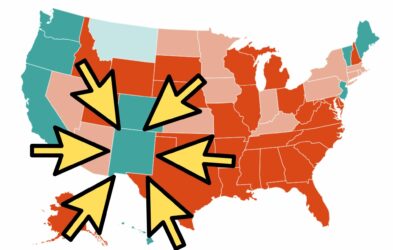This is a full transcript of our Board President George Eighmey’s testimony at today’s joint hearing of the Health and Government Operations Committee and the Judiciary Committee of the Maryland House of Delegates, in support of HB 370, Richard E. Israel and Roger “Pip” Moyer End of Life Option Act. We have formatted the testimony and added subheadings for clarity.
*
Dear Committee members,
Thank you for the opportunity to testify on behalf of HB 370.
My name is George Eighmey, and I am a retired attorney, former Oregon State legislator during the years Oregon’s first in the nation Death with Dignity law was enacted by citizen initiative, former Executive Director for twelve years of the non-profit organization that facilitated the implementation of the Act, and now the president of the board of the oldest organization, Death with Dignity National Center, that has promoted and protected end of life option acts throughout the U.S. using Oregon’s law as the model.
I have been privileged to work with State senators and representatives in Oregon, Washington, Vermont, and California in drafting death with dignity laws and in testifying in support of these laws. We support carefully written laws that protect the vulnerable while providing comfort to those facing the end of life.
As an attorney, legislator, executive director, and board member I have been honored to work with literally thousands of terminally ill patients who considered all their end of life options. The overwhelming majority chose to deal with their pain and suffering by participating in palliative care or enrolling in hospice. However, a few, even while in hospice or receiving palliative care, wished to have the option to choose the timing of their death so as to end their unacceptable pain and suffering.
30 years of flawless implementation
We now have more than nineteen years in Oregon, nine in Washington and three in Vermont of the use of an Oregon type Death with Dignity law. These laws have been flawlessly implemented, aided in the improvement of end of life care, and provided comfort and ease of mind to countless thousands of dying patients. Many have told me that even if they never use the law they found comfort in knowing the option was available.
Studies, most done by Dr. Linda Ganzini, a psychiatrist at Oregon Health and Science University, have shown that not only do dying patients receive better care, but physicians spend more time with their terminally ill patients than before the passage of the act, family members and friends of those who use the law have shorter grieving periods and comforting memories of being able to say goodbye to their deceased love one.
HB 370 modeled on Oregon law
HB 370, the Richard E. Israel and Roger “Pip” Moyer End of Life Option Act, includes all the safeguards and protections that exist in Oregon’s law. When drafting Oregon’s law, we too had concerns. That is why we addressed these concerns in the law.
During the past nineteen years, not a single lawsuit has been filed or even threatened to be filed against those who facilitated the implementation of the law. No substantiated evidence has been given that anyone was coerced into using the law, no one has been denied health or life insurance for considering to use the law.
Data collected show that most patients have health insurance, are enrolled in hospice, and have loved ones present when they ingest the medication.
Peace of mind, peaceful death
It has been my honor to be present with more than four dozen patients who took the legally prescribed medication to end their pain and suffering. Some held end of life celebrations surrounded by loved ones while others had quiet goodbye ceremonies. Some told me there was more love in the room than Fort Knox had gold. Some said life’s journey was to short, but the best journey they could ever wish for.
No matter their age, their station in life, their political or religious persuasion, or wealth, they all appreciated the fact they lived in a state that provided them this option.
I urge you to pass HB 370.
Thank you.

No comments.